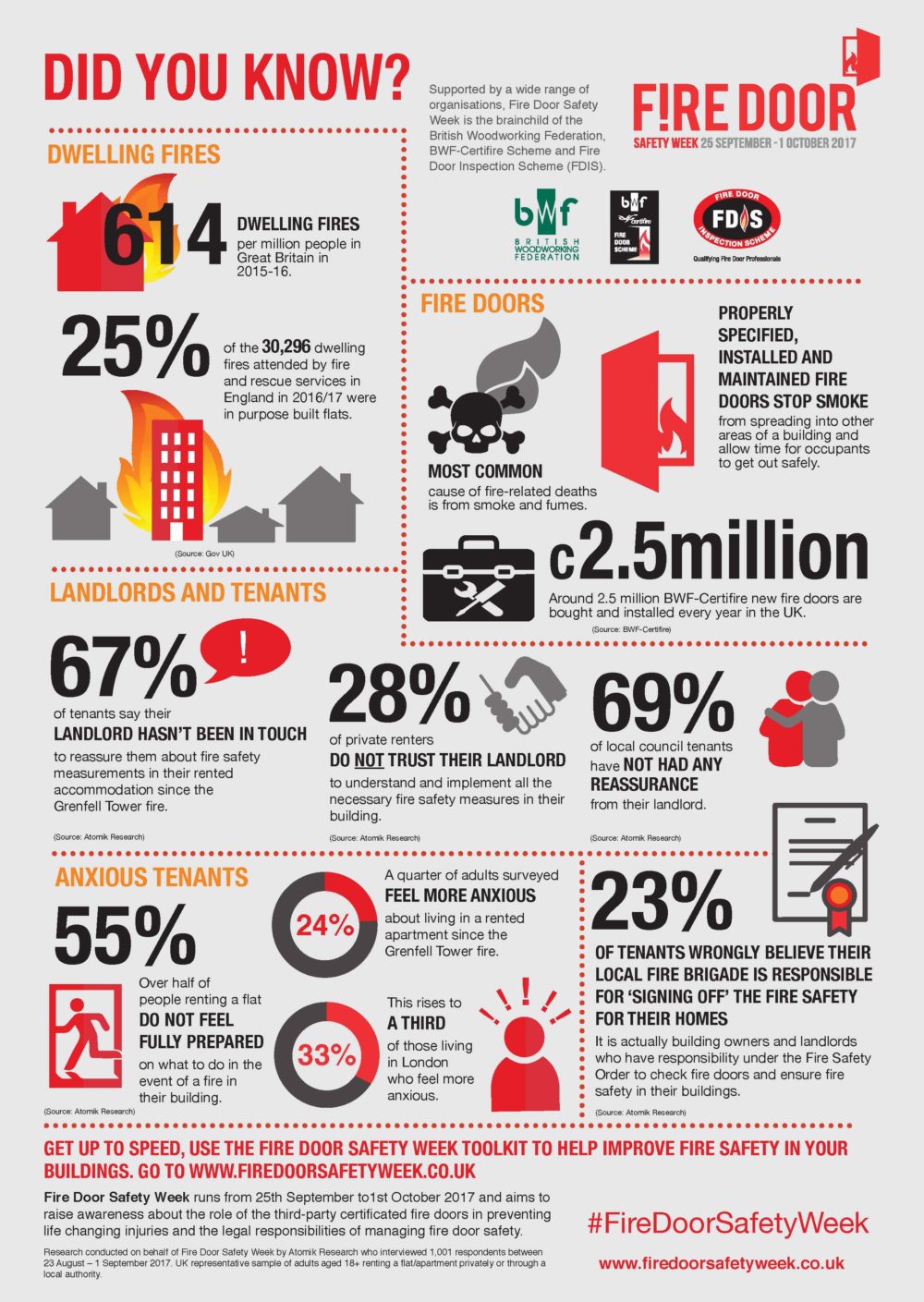Fewer than one in four (23%) private landlords have been in touch with tenants to discuss fire safety measures since the Grenfell Tower fire – and even fewer social landlords have done likewise.
Three months on from the fire, which killed at least 80 people, only 10% of tenants in social housing say they have been contacted by the landlords about fire safety.
That’s one of the headline findings of a survey released to coincide with Fire Door Safety Week (25 September-1 October), and the results seem to demonstrate the need for such a campaign. Some 39% of tenants polled said they had seen fire doors propped open and 21% had noticed damage to their building’s fire doors.
Forty percent of renters said there is no clear fire escape route displayed.
Of the 18% that have reported a fire safety infringement or concern to their landlord, almost a quarter (24%) waited weeks for a response.
“It is astounding to learn that in the last three months so little has been done to address the concerns of tenants and residents.” Hannah Mansell, spokesperson, Fire Door Safety Week
A majority (55%) say they feel uninformed about what they should do in the event of a fire and about one in four (24%) feel more anxious about living in a rented apartment since the Grenfell Tower fire.
“This new research shows that landlords and building owners still have a long way to go meet their fire safety responsibilities,” said Hannah Mansell, spokesperson for Fire Door Safety Week. “It is astounding to learn that in the last three months so little has been done to address the concerns of tenants and residents.”
Misunderstood
The role and importance of fire doors remains widely misunderstood, believes Mansell, who is also BWF technical manager, chair of the Passive Fire Protection Forum and a trustee of the Children’s Burns Trust.
“Many people do not realise that the real job of a fire door is to hold back fire, smoke and toxic gases, delaying the spread around a building and keeping the vital means of escape route clear.
“They only work properly if they are specified, manufactured, installed and maintained correctly and, of course, closed when a fire breaks out. This is especially important in high rise buildings, houses of multiple occupancy and other types of shared sleeping accommodation.
“Checking fire doors should be part of a regular fire-risk assessment. This should examine all aspects of fire safety management, including active and passive fire protection measures, signage, means of escape and the specific fire plan procedures.”
Mansell – who has spoken to IFSEC Global more extensively about the fire safety landscape – believes better education and greater transparency are essential to effect meaningful change.
“Crystal clarity”
“There needs to be crystal clarity about the responsible person and a total transformation of attitude towards fire safety of tenants in rented accommodation. Our focus for Fire Door Safety Week in this pivotal year is to ensure all landlords and tenants have the knowledge and resources they need to stay safe.”
Dany Cotton, London Fire Commissioner, oversaw the fire and rescue service’s response at Grenfell Tower.
“London Fire Brigade fully supports Fire Door Safety Week,” she said. “This is an important campaign which drives home the potentially life-saving role that fire doors play in buildings, especially residential buildings such as tower blocks.
“It is extremely concerning that the lives of the public and our firefighters are still being put at risk by poorly maintained fire doors and people acting irresponsibly by removing self-closers or by keeping doors wedged open.
“We do what we can to advise the building owner, but it’s time for the responsible person to really step up.” Paul Fuller CBE, chief fire officer, Bedfordshire Fire and Rescue Service
“Good fire doors help stop fires from spreading. Fires that spread put more lives at risk and I would urge everyone to check that their fire doors are properly maintained and kept shut. Remember they don’t just protect you, but everybody in the building.”
Paul Fuller CBE, chief fire officer of Bedfordshire Fire and Rescue Service and chairman of the Fire Sector Federation says:
“It is simple. Proper fire doors save lives, but only if they are correctly made and installed, and certainly not if they are wedged open or in disrepair.
Too often our officers walk into a building and see fire doors in an appalling state. We do what we can to advise and enforce the responsibilities of a building owner, but it is time for the responsible person to really step up.
That’s why we are supporting Fire Door Safety Week. There can be no excuse; all the resources you need to promote door safety are there on the website and free to download.”
Fire Door Safety Week is run by the BWF, the BWF-Certifire Scheme and the Fire Door Inspection Scheme in partnership with the Government’s Fire Kills campaign.
On 30 August the Government issued fresh advice for tenants and residents on steps to take if they have any concerns about fire safety in their building:
- In the first instance, contact the landlord or building owner with any concerns.
- If still concerned and not receiving reassurance, then contact the relevant local authority or local fire and rescue service for advice.
IFSEC Global is proud to support Fire Door Safety Week, which runs from 25 September to 1 October. You can pledge your support for the campaign here, and by tweeting under the hashtag #FireDoorSafetyWeek and sharing or using the wealth of resources found in the campaign’s toolkit – which includes a downloadable ‘Responsible Person’ poster.
The site also includes advice aimed at fire and health and safety professionals.
2023 Fire Safety eBook – Grab your free copy!
Download the Fire Safety in 2023 eBook, keeping you up to date with the biggest news and prosecution stories from around the industry. Chapters include important updates such as the Fire Safety (England) Regulations 2022 and an overview of the new British Standard for the digital management of fire safety information.
Plus, we explore the growing risks of lithium-ion battery fires and hear from experts in disability evacuation and social housing.



Surprising results in the article. Our own situation is that we wrote to every resident explaining the ‘stay put unless …’ policy, backed up with updates on our website; the situation with their building and that all properties will be re-assessed post Grenfell with an opportunity to ask questions, have home visits by the H&S Manager and / or the local Fire Brigade. Not many residents appeared concerned from the responses received and still we have residents saying that they haven’t been contacted. With regard to fire doors, we provided all our surveyors with some basic training and fire door… Read more »